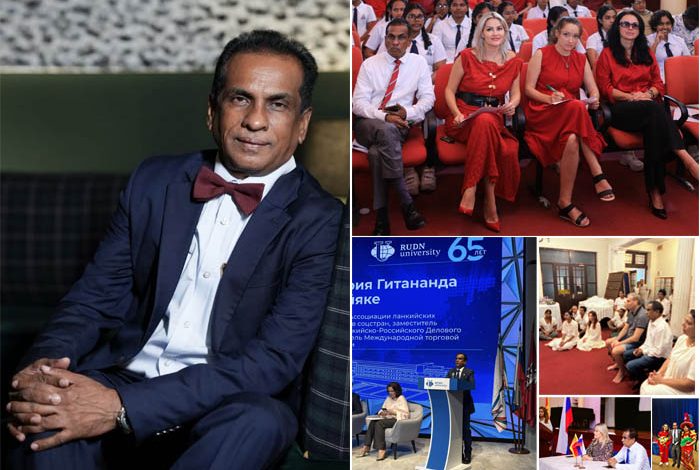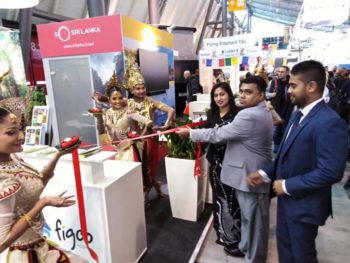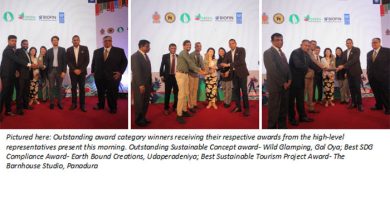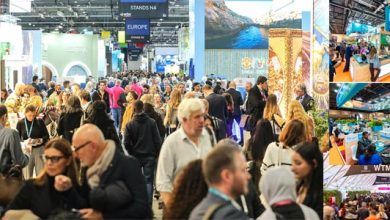A Journey of Culture and Connection

CeylonDigest presents an exclusive interview with Buddhapriya Geethananda Ramanayaka, Chief Executive Officer of the Cultural Section at the Embassy of the Russian Federation in Sri Lanka.
In the delicate choreography of diplomacy, where nations share whispered tales and dreams entwine like threads in a grand tapestry, Buddhapriya Ramanayaka emerges as a keeper of bridges—a guardian of stories between Sri Lanka and Russia. Born in 1965, under the nurturing skies of D.S. Senanayake College, his early years were the gentle prelude to a life that would cross continents and cultures, weaving bonds that transcend mere geography.
Summoned by a full scholarship from the Russian Government, he journeyed to the hallowed halls of Patrice Lumumba People’s Friendship University in Moscow—a place where walls dissolve and the spirit of fellowship reigns supreme. Among frost-laden rooftops and timeless spires, he immersed himself in Economics, earning his degrees and planting the seeds of unity that would grow throughout his career.
But Mr. Ramanayaka’s path is one of more than policy and procedure. He is a cultural envoy, a bridge where commerce meets creativity, education kindles curiosity, and tradition flows into innovation. His hand has guided countless delegations along corridors of goodwill, fostered student exchanges that bloom with promise, and sparked collaborations in realms both visible and unseen.
His dedication has been recognized in the highest esteem—the Russian Government’s “Friendship Medal” in 2006, and the “Longstanding Service Medal” awarded by Foreign Minister Sergey Lavrov, tokens of the respect and trust earned over decades.
His leadership echoes across roles shaping the future: Chairman of International Affairs and Sustainable Finance at Sri Lanka’s International Chamber of Commerce, Vice President of the Sri Lanka-Russia Business Council, and President of the Association of Sri Lankan Graduates from Socialist Countries. Yet, his truest mark lies in moments of compassion—leading logistics and relief during the harrowing 2004 tsunami, where humanity and determination converged.
Fluent not only in languages but in the poetry of diplomacy and culture, Buddhapriya Ramanayaka’s journey is a testament to the enduring power of connection. In this conversation, he unveils the values that light his path, the heartbeats behind his milestones, and the vision of a world bound not by borders, but by friendship and hope.
Exclusive Interview
Buddhapriya Geethananda Ramanayaka
Chief Executive Officer – Cultural Section, Embassy of the Russian Federation
Q: You’ve studied and worked across continents. What first drew you into the world of international diplomacy and cultural relations?
A: Honestly, it all began as a coincidence. During my school days, Mr. Lalith S. Kumara, a renowned radio presenter, visited our school for an Ovaltine-sponsored “Dueno Contest” session. While chatting, he asked about my hobbies. I mentioned my interest in world politics and international relations. He was visibly surprised to hear such a response from a young boy. That moment stuck with me—it helped me realize that my curiosity for global affairs wasn’t ordinary. It eventually evolved into a passion and, over time, steered me into the field of diplomacy and cultural engagement.
Q: How did your student years at Patrice Lumumba University shape your view of global cooperation and Sri Lanka’s place in the world?
A: Patrice Lumumba University was a dream institution for many Sri Lankan youth. It was founded with a powerful mission—to uplift students from newly independent nations. I was fortunate to receive a government scholarship via the Ministry of Higher Education.
Those years were truly transformative. I served as the Sports Secretary, and later as Secretary, Treasurer, and President of the Sri Lankan Student Council. It felt like the entire world was gathered in one place. The diversity and camaraderie I experienced created lifelong friendships beyond race or nationality.
A defining moment for me was attending the 13th World Festival of Youth and Students in North Korea—a turning point that opened my eyes to the real power of unity, culture, and Sri Lanka’s meaningful role in international dialogue.
Q: What role do cultural ties play in strengthening the Sri Lanka–Russia relationship, beyond traditional diplomacy?
A: Cultural ties go deeper than policy—they build emotional and intellectual bridges. The Russian House in Colombo has played an extraordinary role in promoting Russia’s cultural treasures, particularly classical ballet and chess.
We proudly host the Russian School of Ballet and the Anatoly Karpov Chess Club at the Russian House. These institutions cultivate both “brain and beauty” in our youth and offer meaningful engagements that go beyond borders.
Q: How do you personally define diplomacy—not just in terms of statecraft, but human connection?
A: True diplomacy begins with people. It’s not just about treaties or summits—it’s about trust. During my journey, I’ve met inspiring individuals from around the world, and one simple principle has always guided me: give respect to earn respect. That’s the soul of diplomacy.
Q: Receiving the “Friendship Medal” from the Russian Government must have been a profound moment. What did it signify to you?
A: I’ve been honored with three notable medals in my career, but the Friendship Medal holds a special place in my heart. It signifies the journey I began in 1998—just years after the Soviet Union’s collapse, during a time of uncertainty in global affairs. That recognition represents not just my service, but a testament to Sri Lanka’s enduring friendship with Russia.
Q: How has your family shaped your commitment to public service and cultural bridge-building?
A: My wife, also a graduate of Patrice Lumumba University, shares my admiration for Russian traditions. Her support has been constant and meaningful throughout this demanding path. Our son, Nikitha—named to honor our fond memories of Russia—grew up with strong values of cultural appreciation and mutual respect. My family’s shared belief in cross-cultural understanding has been my greatest pillar.
Q: What initiatives have been most impactful in fostering real friendship between our two nations?
A: Student exchange and language programs are both crucial. Language isn’t just a communication tool—it’s a gateway to a nation’s soul. These programs have fostered friendships that last a lifetime.
Today, two Sri Lankan universities offer Russian language courses, and Moscow State University even teaches Sinhala—an extraordinary gesture of goodwill. Russia remains one of the most generous scholarship providers for Sri Lankan students, and that support has changed countless lives.
Q: You’ve led delegations to international youth forums. What’s one unforgettable moment from those journeys?
A: Representing Sri Lanka at the World Youth Festival in Pyongyang, North Korea, was unforgettable. I was the sole Sri Lankan delegate and spent 28 eye-opening days there. Visiting the border between North and South Korea was both emotionally and historically profound—an experience that reshaped my global outlook.
Q: How can Sri Lanka better integrate its artistic and touristic heritage into global branding?
A: Sri Lanka has incredible natural and cultural assets. But international branding isn’t only about what we offer—it’s about how we offer it. We must elevate our services and infrastructure to meet international standards, while presenting our identity with pride and professionalism. Our hospitality, much like our Ceylon Tea, is world-renowned. That warmth should be at the core of our tourism brand.
Q: What are three must-visit places in Sri Lanka that reflect our national spirit?
A: Anuradhapura, Kandy, and Sigiriya. Anuradhapura resonates with spiritual heritage, Kandy celebrates living culture, and Sigiriya is a marvel of ancient art and architecture. These places embody Sri Lanka’s soul.
Q: How do you see Russian tourists engaging with Sri Lanka’s cultural and wellness tourism?
A: There’s immense potential. Even during the COVID-19 pandemic and after the Easter Sunday tragedy, direct flights from Russia continued. Russians appreciate Ayurveda, cultural festivals, and warm coastal retreats. We need more Russian-speaking professionals in tourism and should focus on maintaining ten high-quality sites—it will amplify our appeal quickly through word of mouth.
Q: What motivates you personally in your role, and how does your work contribute to Sri Lanka’s cultural and tourism growth?
A: As CEO of the Russian House, my mission is to represent Sri Lanka in the best light. We actively share news and cultural content on RT and Russian Telegram channels. Our storytelling fosters trust and promotes Sri Lanka’s beauty, opportunity, and potential to a wider audience. Each outreach builds stronger bonds and mutual respect.
Q: What message would you offer to young Sri Lankans aspiring to careers in international relations or cultural exchange?
A: Education is your greatest tool. Learn languages. Read widely. Stay curious. Dream with purpose and work with discipline. In cultural exchange, language is the bridge. With determination, Sri Lankan youth can make a global impact.
Q: How do your leadership roles in cultural and business councils promote Sri Lanka globally?
A: Holding key positions—like Chairman of International Relations at ICC Sri Lanka and Vice President of the Sri Lanka–Russia Business Council—has allowed me to connect Sri Lanka to global networks. Through ICC, a 130-year-old Paris-based institution, we gain access to the world’s top trade forums. These roles allow us to showcase Sri Lanka’s exports, culture, and investment potential across multiple spheres.
Q: You were part of the 2004 Tsunami relief operations. How did that experience impact you?
A: Coordinating with the Russian Ambassador to bring in the first relief flight after the tsunami was a defining moment. The government was paralyzed for 48 hours, and the Center for National Operations (CNO) became a lifeline. I must acknowledge the incredible leadership of Dr. Thara De Mel during that crisis. It deepened my sense of purpose in public service.
Q: Who have been your greatest mentors or role models in life and career?
A: Professionally, President Vladimir Putin has been a towering inspiration. I read his autobiography and was fortunate to meet him and visit places from his childhood. His resilience in rebuilding post-Soviet Russia deeply moved me.
Personally, my greatest teachers were my parents. They instilled in me values of humility, kindness, and integrity—lessons that continue to shape every step I take.
Q: What is your vision for the future of Sri Lanka–Russia relations?
A: I’m not just a dreamer—I believe in action. I envision a future where Sri Lanka and Russia share deeper economic cooperation, especially in energy. Russia’s expertise in nuclear energy could help us tackle rising fuel and electricity costs.
Culturally, I see vast potential in rural tourism and spiritual exchanges—especially with the Buddhist republics in Russia. Let the benefits flow to our rural communities. With bold leadership and vision, Sri Lanka can transform.
In a world increasingly shaped by connection, Buddhapriya Geethananda Ramanayaka stands as a beacon of cultural diplomacy and national pride. Through every bridge he builds, every student he mentors, and every heartfelt story he shares, he reminds us that Sri Lanka’s true strength lies in art, humanity, and mutual respect.
The legacy he crafts today will inspire tomorrow’s generation to dream wider, reach farther, and honor the roots that shape our collective future.






